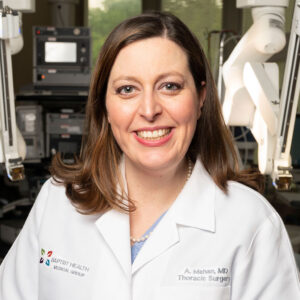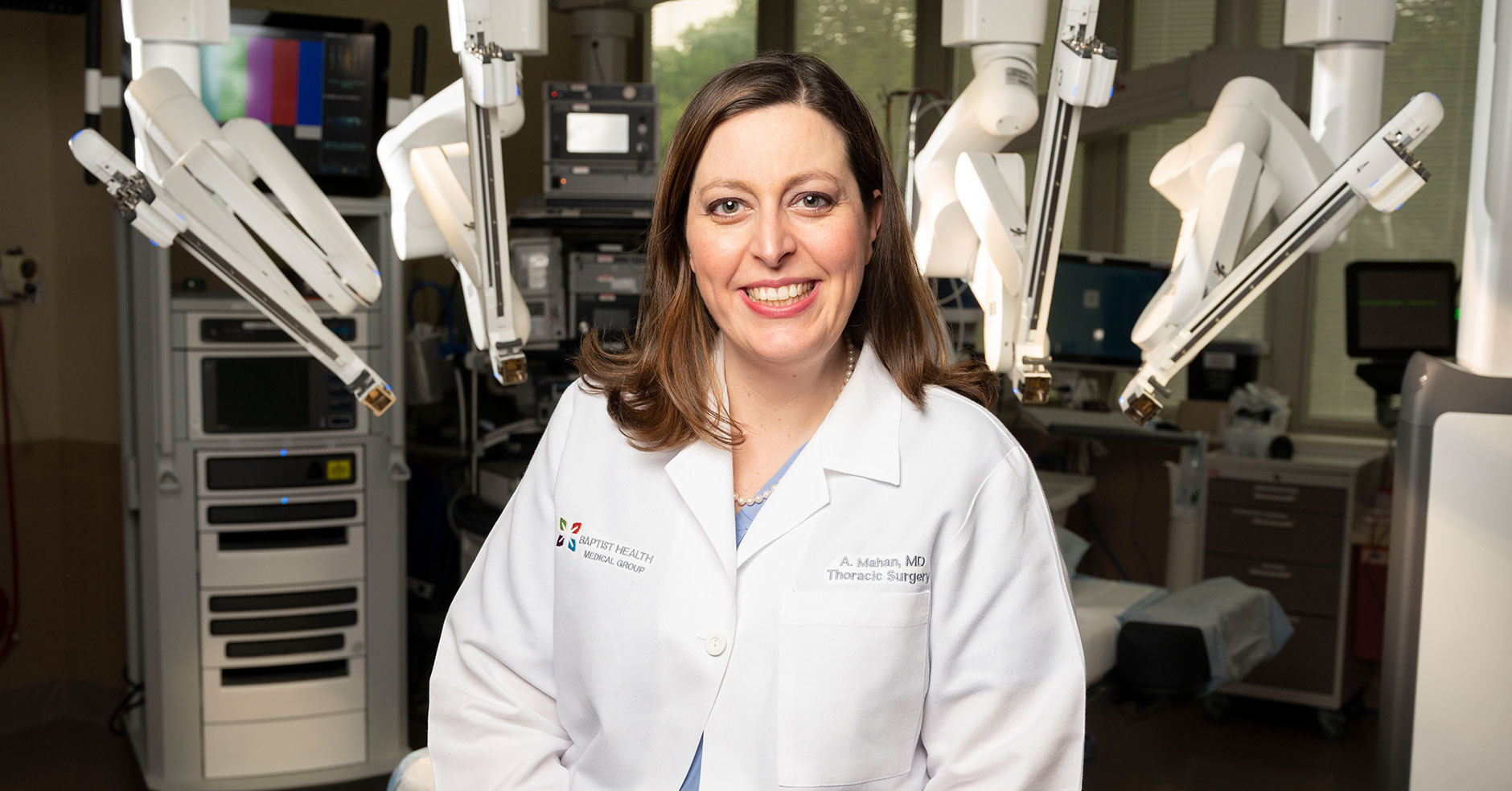At Baptist Health Louisville, Angela Mahan, MD, is improving lung cancer outcomes through advanced technologies, early detection, and minimally invasive surgery.
LOUISVILLE For Angela Mahan, MD, a thoracic surgeon at Baptist Health Louisville, technology is not just a tool—it’s a lifeline. New diagnostic systems are providing detection at the earliest level, which for lung cancer means a 90% chance of five-year survival: “If we can just shift that stage of diagnosis, we save lives, and that’s why I’m excited about all of our new technology here,” says Mahan. Artificial intelligence, navigational bronchoscopy, and robotic surgery are revolutionizing how lung cancer is detected, diagnosed, and treated, and Mahan is at the forefront of this evolution.
When Cancer Hits Close to Home
Mahan’s passion for cancer care was shaped in large part by her family’s deep history with breast cancer. According to Mahan, “My mom is one of 11, and my family has the BRCA gene. When I was growing up, a lot of my family members had cancer and subsequent treatment. I decided when I was in medical school that I wanted to be involved in cancer care. I fell in love with surgery, so I wanted to do something surgical oncology related.”
However, because of the personal proximity of breast cancer, she chose to take a slightly different path: “Thoracic surgery offered an avenue to not have to deal with something that was too close to home, but still be able to be a surgical oncologist.” Now at Baptist Louisville, Mahan leads a high-volume thoracic surgery practice focused primarily on lung and esophageal cancers.
After earning her undergraduate degrees in chemistry and biology at the University of Kentucky, Mahan completed medical school at the University of Louisville in 2006. She

went on to the University of Colorado for general surgery residency, where she decided to specialize in thoracic surgery. She returned to Kentucky to complete a thoracic surgery fellowship and stayed on as faculty at the University of Kentucky until transitioning to Baptist Health Louisville in 2018.
Prioritizing Prevention
As Kentucky remains one of the most affected states for new cancer diagnoses, Mahan finds herself seeing upward of 50 patients per week. “There is an awful lot of lung cancer everywhere. In Kentucky, we are 48th in the nation for the number of new cancers diagnosed,” she stated.
Her patient base has historically been older men with significant smoking histories. However, she notes a trend that is gaining national attention: “Nowadays, though, I’m seeing—and the whole country is seeing—a rise in women being diagnosed with lung cancer and non-smokers being diagnosed with lung cancer for reasons we don’t understand yet.”
With this rise, Mahan realizes preventing cancers in the first place is even more paramount. She is passionate about smoking cessation, dedicating substantial time and resources to helping her patients quit. “Out of all the things that you can do to decrease your chances of getting lung cancer, stopping exposure is the most important.” Mahan also has strong opinions on vaping and the misconception that it is somehow safer than cigarette smoking. She states, “It’s not so much the tobacco that’s injuring the lungs, right? It’s the additives, it’s the smoke itself. Vaping has those same things, and so no matter what you’re doing to inhale into your lungs, you’re causing injury to the lungs, which causes the problem.”
Innovations Are Increasing Lifespans
Mahan says that what excites her most are the technologies that are making earlier detection and optimal outcomes possible—among them: AI software that scours every imaging report across the Baptist system to flag lung nodules for immediate follow-up. “Over the past five years, there have been AI software programs that scrub the medical records of every single imaging scan done at Baptist Health, which allows us to recognize problems and get patients in sooner.”
Baptist Health is at the forefront of utilizing minimally invasive surgical—including robotic surgery—options to further enhance recovery and longevity. She states, “Robotic surgery is a minimally invasive technique that allows us to go into the chest without making big incisions. We’ve done about 1,400 robotic lung surgeries at Baptist. I can’t remember the last time I did an open surgery.”
Mahan is trained on the da Vinci Surgical System. She also utilizes the Ion system to perform robotic navigational bronchoscopy, which allows surgeons to navigate to lesions in the lung using GPS technology. The technique boasts a high safety profile with less than 2% chance of complications happening with the procedure.
These innovations have led to measurable changes. In the words of Mahan, “Before all the new technology came out, we were diagnosing about 35% of people with Stage 1 lung cancer and about 35% or higher with Stage 4. Since we have implemented these programs, we’re at about 55% Stage 1 and climbing. We have decreased our stage four diagnoses to 20% or less.”
The Proof Is in the Prognosis
Mahan is deeply involved in collaborative care. She participates in multiple tumor boards each month across the Baptist Health system. “We have a tumor board that meets weekly at Baptist Louisville, another that meets weekly at Baptist Health Hardin, and one that gathers every other week at Baptist Health Floyd.” While Stage 1 lung cancer patients are typically surgical candidates, treatment decisions—especially for more advanced stages—are made by a multidisciplinary team that includes medical and radiation oncologists. This team approach, coupled with the aforementioned technologies, allows for more tailored treatments leading to previously unachievable results.
One of Mahan’s most memorable cases exemplifies this: “About a year ago, I had a 67-year-old patient with a nine-millimeter lung nodule. He got his screening scan on a Wednesday. I saw him the following Thursday. He had his biopsy the following Tuesday, and he had his lung out a week after that… From his diagnosis of lung nodule to his cure from his lung cancer was two weeks.” That kind of timeline, though not always feasible for every patient, is her goal. “That’s the case that I would like to do for every patient. I would like every patient to get through their cancer treatment within a month.”
And though the initial diagnosis and treatment may only last a month, follow-up care is critical and continuous. She explains, “If you have Stage 1 lung cancer, you know you’re going to see me at least twice a year for five years, and then every year for ten years.”
Reflecting on the Past, Looking to the Future
Mahan’s dedication and passion are deeply tied to her past. “Growing up and seeing my family with cancer, and seeing the care that they got from their specialists… If we can give someone a cure from their lung cancer or a cure from their esophagus cancer, then that gives that person back their life. That gives that family their mom or their dad or their grandpa back… that’s so powerful to me and so motivating to me.”
As for the future, Mahan hopes that lung cancer, like breast cancer, will become a survivable diagnosis through early detection. “I think it’s important to stress that… we are seeing a significant stage shift to early-stage lung cancer. And I would hope that the earlier we are able to find those lung nodules and lung cancers, that that changes their survival curve for lung cancer, just like breast cancer.”




